| 1935 | This is where it all started for Fred Heath . . . . |
|
|
|
| November 23rd |
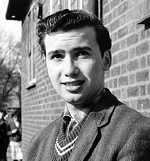 Frederick
Albert Heath, born to Ernest and
Margaret Heath in Willesden, North London. And yes, it is 1935
and not 1939, which is probably what his later publicists reported.
Fred is Frederick
Albert Heath, born to Ernest and
Margaret Heath in Willesden, North London. And yes, it is 1935
and not 1939, which is probably what his later publicists reported.
Fred is
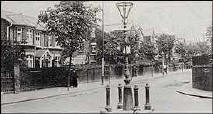 the
youngest of three children, he has a brother, Lance, and a sister, June.
Music is in the family; Grandmother played the piano (by ear) and
Grandfather played the bones. Ernest Heath was one of eight children,
four brothers and three sisters. All the family gets on well together,
including a family music group and even a family business as builders in the
locality. the
youngest of three children, he has a brother, Lance, and a sister, June.
Music is in the family; Grandmother played the piano (by ear) and
Grandfather played the bones. Ernest Heath was one of eight children,
four brothers and three sisters. All the family gets on well together,
including a family music group and even a family business as builders in the
locality. |
|
|
|
| 1937 | |
| August 20th |
 Clement (Clem) Catinni born in Stoke Newington, London.
His Italian father had entered Britain in the early 1900's and set up a
reasonably successful career in the restaurant trade. Clem missed the
recently-abolished National Service, leaving him free to develop his career
as a new, original Rock Drummer, as opposed to a Jazz or Big Band musician
embracing a new trend. Ideal as Pirate drummer, 1960-61 before joining
the Tornados and playing on their transatlantic number one pop instrumental,
"Telstar". Clement (Clem) Catinni born in Stoke Newington, London.
His Italian father had entered Britain in the early 1900's and set up a
reasonably successful career in the restaurant trade. Clem missed the
recently-abolished National Service, leaving him free to develop his career
as a new, original Rock Drummer, as opposed to a Jazz or Big Band musician
embracing a new trend. Ideal as Pirate drummer, 1960-61 before joining
the Tornados and playing on their transatlantic number one pop instrumental,
"Telstar". |
|
|
|
| 1939 | |
|
January 31st |
 Brian
Gregg born on the 31st of January 1939 in London, but was raised in the
Highlands of Scotland. A solid professional career as bass guitarist
in a variety of acts, including a spell backing the English "answer" to
Elvis, Terry Dene. Recruited to the Pirates alongside Clem Catinni
"until something better came along!" Brian
Gregg born on the 31st of January 1939 in London, but was raised in the
Highlands of Scotland. A solid professional career as bass guitarist
in a variety of acts, including a spell backing the English "answer" to
Elvis, Terry Dene. Recruited to the Pirates alongside Clem Catinni
"until something better came along!" |
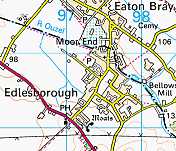 At less than four years of age,
a shy Fred, his sister June and other local children are evacuated some
thirty miles away to the Buckinghamshire village of Edelsborough,
three miles south-west of Dunstable (and a close neighbour to Whipsnade) to avoid the air raids that are becoming a regular
feature of life in the capital. Their home was in the Vicarage,
which was attached to the village church. Fred and June's father
Ernest used to cycle the thirty miles to see them at weekends, once
through a terrible snowstorm! At less than four years of age,
a shy Fred, his sister June and other local children are evacuated some
thirty miles away to the Buckinghamshire village of Edelsborough,
three miles south-west of Dunstable (and a close neighbour to Whipsnade) to avoid the air raids that are becoming a regular
feature of life in the capital. Their home was in the Vicarage,
which was attached to the village church. Fred and June's father
Ernest used to cycle the thirty miles to see them at weekends, once
through a terrible snowstorm! |
|
|
|
|
| 1940 | |
| February 2nd |
 Alan
"Art"
Caddy born in Chelsea, London. Developed a 'chunky' style to fill in
the gaps left by the lack of a rhythm guitarist after the original seven-man
Pirates broke up at the beginning of the 1960's. The re-formed Pirates
were a trio, more for economical reasons and visual effect than the sound
which (in those days at least) could be pretty rotten in the wrong venue!
This would be addressed as the Sixties' got under way and amplification
equipment rapidly developed. Alan
"Art"
Caddy born in Chelsea, London. Developed a 'chunky' style to fill in
the gaps left by the lack of a rhythm guitarist after the original seven-man
Pirates broke up at the beginning of the 1960's. The re-formed Pirates
were a trio, more for economical reasons and visual effect than the sound
which (in those days at least) could be pretty rotten in the wrong venue!
This would be addressed as the Sixties' got under way and amplification
equipment rapidly developed. |
|
|
|
| 1941 | |
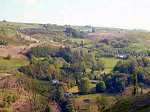 The
war has got worse, and the south-east of England is prone to attacks by the
Luftwaffe - but not exclusively, as attacks on towns and cities spread
further north and west. Fred and his sister are re-evacuated, this time to the
North Wales village of Pontrhydygroes, set in a landscape of historically
complex character. Here, young Freddie begins his singing career
by singing with the local folk, and progresses to joining the Band Of Hope as a choirboy
in the Aberystwyth local church. The
war has got worse, and the south-east of England is prone to attacks by the
Luftwaffe - but not exclusively, as attacks on towns and cities spread
further north and west. Fred and his sister are re-evacuated, this time to the
North Wales village of Pontrhydygroes, set in a landscape of historically
complex character. Here, young Freddie begins his singing career
by singing with the local folk, and progresses to joining the Band Of Hope as a choirboy
in the Aberystwyth local church. |
|
|
|
|
| 1942 | |
| February 18th |
 Frank
William
Farley born in Belgaum, India and brought up in Wimbledon. Had a spell in the
Merchant Navy before entering the music world. Drummer with the Pirates, late 1961 - early 1966.
Mick Green literally made a huge impression on Frank Farley by performing
the the act of falling out of a tree, right on top of the big feller's head.
It is not thought that Frank felt this was a pleasurable event at the
time.... Frank
William
Farley born in Belgaum, India and brought up in Wimbledon. Had a spell in the
Merchant Navy before entering the music world. Drummer with the Pirates, late 1961 - early 1966.
Mick Green literally made a huge impression on Frank Farley by performing
the the act of falling out of a tree, right on top of the big feller's head.
It is not thought that Frank felt this was a pleasurable event at the
time.... |
| December 13th |
 Vic
(Victor) Cooper born in Oxford. Added dedicated organ sound to the
Pirates sound in 1964, not an unsound move considering the number of
emergent groups featuring the instrument at the time. Vic
(Victor) Cooper born in Oxford. Added dedicated organ sound to the
Pirates sound in 1964, not an unsound move considering the number of
emergent groups featuring the instrument at the time. |
|
|
|
| 1944 | |
| January 26th |
 Johnny
Spence (John Spencer Holliday) born in London. Was a window dresser before turning to Piracy. Bassist from late 1961 to early 1966 and
longest-serving Pirate, equally held with Frank Farley. Became the Kidd's
best friend - he was the Best Man at The Guv'nor's wedding to Jean in
1966. Johnny
Spence (John Spencer Holliday) born in London. Was a window dresser before turning to Piracy. Bassist from late 1961 to early 1966 and
longest-serving Pirate, equally held with Frank Farley. Became the Kidd's
best friend - he was the Best Man at The Guv'nor's wedding to Jean in
1966. |
| February 22nd |
 Mick
Green born. Before becoming a professional musician had an unusual job
as a Diamond Mounter. Took over lead guitar duties from Johnny Patto when the
latter fell ill with severe ulcers. Developed the guitar style of
mixing rhythm and lead parts quite seamlessly, which inspired a generation
of Rock guitarists in a quite different mould to the clean-cut, melody
line-driven style of Hank Marvin and his followers. Mick
Green born. Before becoming a professional musician had an unusual job
as a Diamond Mounter. Took over lead guitar duties from Johnny Patto when the
latter fell ill with severe ulcers. Developed the guitar style of
mixing rhythm and lead parts quite seamlessly, which inspired a generation
of Rock guitarists in a quite different mould to the clean-cut, melody
line-driven style of Hank Marvin and his followers. |
|
|
|
| 1945 | |
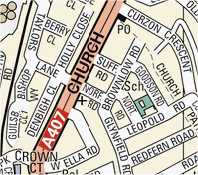 Eventually the effects of war begin to subside and the children are
re-united with their families in Willesden. The bomb shelters are
still standing and make exciting places for the kids to play, along with the
bomb sites. Perhaps as a result of living with among the Welsh Fred has
come out of his shell somewhat and begins making many friends in his local area
around Leopold Road, the majority of whom went to the Leopold Road School
(still there today).
Life was tough though, as money was short and rationing was still the norm,
and would remain so for the foreseeable future.
Fashion wasn't high on the agenda then..... Eventually the effects of war begin to subside and the children are
re-united with their families in Willesden. The bomb shelters are
still standing and make exciting places for the kids to play, along with the
bomb sites. Perhaps as a result of living with among the Welsh Fred has
come out of his shell somewhat and begins making many friends in his local area
around Leopold Road, the majority of whom went to the Leopold Road School
(still there today).
Life was tough though, as money was short and rationing was still the norm,
and would remain so for the foreseeable future.
Fashion wasn't high on the agenda then..... |
|
| November 3rd |
 Nick
Simper, born in Frogmore House Maternity Home in Norwood Green, Southall in Middlesex. Not quite a lead
guitarist but found a niche as a bassist with various groups. A
long-time fan of Johnny Kidd and the Pirates, his dream of backing the Guv'nor came true when joining as Pirates bassist, along with guitarist Mick
Stewart and drummer Roger Truth in May 1966. Nick
Simper, born in Frogmore House Maternity Home in Norwood Green, Southall in Middlesex. Not quite a lead
guitarist but found a niche as a bassist with various groups. A
long-time fan of Johnny Kidd and the Pirates, his dream of backing the Guv'nor came true when joining as Pirates bassist, along with guitarist Mick
Stewart and drummer Roger Truth in May 1966. |
|
|
|
| 1946 | |
 On passing his 11+ Fred goes on to further his
education at the Willesden Tech in Denzil road. Being witty and funny
Fred made good company, and good friends. He also became good at drawing and sketching. On passing his 11+ Fred goes on to further his
education at the Willesden Tech in Denzil road. Being witty and funny
Fred made good company, and good friends. He also became good at drawing and sketching. |
|
|
|
|
| 1947 | |
| April 21st |
 John Weider
born in Shepherd's Bush, London. Lead guitarist with the Pirates
1964-5, took over from Mick Green during a spell at Blackpool, and left
after a season at the same venue the following year. Joined Eric
Burdon and his New Animals after which he went on to carve out a successful
solo career. John Weider
born in Shepherd's Bush, London. Lead guitarist with the Pirates
1964-5, took over from Mick Green during a spell at Blackpool, and left
after a season at the same venue the following year. Joined Eric
Burdon and his New Animals after which he went on to carve out a successful
solo career. |
|
|
|
| 1950 | |
 At
age 15 Fred leaves Willesden Poly on Dudden Hill Lane (now the "College of
North West London"). The
local snooker halls are the favourite haunts of Fred with friends Alan
Carter and Bill Smallwood. Fred is a good enough player to be a bit of
a hustler, regularly beating his chosen opposition for cash which they will
spend on espresso coffee and cigarettes. Sometimes they go on to the
White City Dog Track and even grow their capital, but would usually end up
blowing it. At
age 15 Fred leaves Willesden Poly on Dudden Hill Lane (now the "College of
North West London"). The
local snooker halls are the favourite haunts of Fred with friends Alan
Carter and Bill Smallwood. Fred is a good enough player to be a bit of
a hustler, regularly beating his chosen opposition for cash which they will
spend on espresso coffee and cigarettes. Sometimes they go on to the
White City Dog Track and even grow their capital, but would usually end up
blowing it. |
|
|
|
|
| 1951-55 | |
| November 23rd |
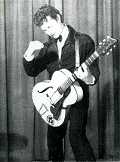 Fred's
Uncle George, impressed with Fred's enthusiasm for music, gives him a banjo
for his sixteenth birthday, which becomes the turning point in Fred's life.
After wearing it out he obtains another off a Rag 'n' Bone Man's cart which
he repairs and eventually trades in for a guitar. Best mate Johnny
Irving (who'd later become Johnny Kidd's road manager) reckoned Fred was
good enough to be a rhythm guitarist had he not made it as a singer. Fred's
Uncle George, impressed with Fred's enthusiasm for music, gives him a banjo
for his sixteenth birthday, which becomes the turning point in Fred's life.
After wearing it out he obtains another off a Rag 'n' Bone Man's cart which
he repairs and eventually trades in for a guitar. Best mate Johnny
Irving (who'd later become Johnny Kidd's road manager) reckoned Fred was
good enough to be a rhythm guitarist had he not made it as a singer. |
|
Fred has various jobs. One of his first
jobs on leaving school is at the "White Heather Laundry", which was a laugh
with a mate who also worked there. Disproportionate amounts of soap
powder made for large amounts of bubbles everywhere and once Fred threw another
friend in a dryer. At "Hewitts Dyers and Cleaners" he uses a special
steam gun with a brush on the end. Made to remove stains, in Fred's
hand it sometimes removed the fabric as well....
|
|
|
|
|
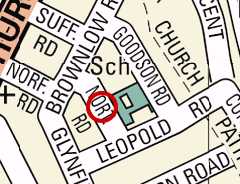 Other jobs include a spell as a house painter,
and a job in the woodyard in Northcote Road, which is just off Fred's home
road of Leopold Road. He was once a
runner for a local bookmaker, Taffy Morgan, and was so good at it he
literally ran off with £80 bet money and wasn't seen for a week! One
thing all Pirate line-ups appear to agree on is that he was not adverse to a
little flutter now and then - sometimes with some of the gig money before they'd
all
been paid. Pinball machines were to become another favourite with him.
Other jobs include a spell as a house painter,
and a job in the woodyard in Northcote Road, which is just off Fred's home
road of Leopold Road. He was once a
runner for a local bookmaker, Taffy Morgan, and was so good at it he
literally ran off with £80 bet money and wasn't seen for a week! One
thing all Pirate line-ups appear to agree on is that he was not adverse to a
little flutter now and then - sometimes with some of the gig money before they'd
all
been paid. Pinball machines were to become another favourite with him.